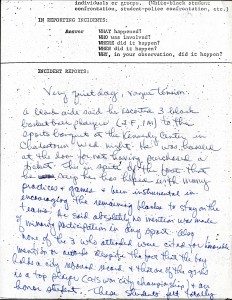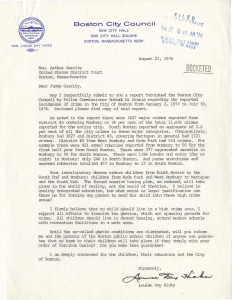
Please contact us at library.archives@umb.edu with any questions or for research assistance. We are here to help you!
This exercise will provide you with experience analyzing different kinds of archival materials from University Archives and Special Collections. Using digitized records from the W. Arthur Garrity, Jr. chambers papers on the Boston Schools Desegregation case, you will engage in activities focused on selecting and studying 3 different digitized archival records:
If you're interested, you can view the full finding aid for Judge Garrity's papers here.
If you need assistance, please email jessica.holden@umb.edu.
 The papers in this collection constitute a day-to-day file documentation of Morgan v. Hennigan, 379 F. Supp. 410 (1974), commonly known as the Boston Schools Case, a class action suit against the Commonwealth of Massachusetts and the Boston School Committee. The case went to trial before Federal District Court Judge W. Arthur Garrity, Jr., who on June 21, 1974, filed a 152-page opinion ruling that the School Committee of the City of Boston had "intentionally brought about and maintained racial segregation" in the Boston public schools.
The papers in this collection constitute a day-to-day file documentation of Morgan v. Hennigan, 379 F. Supp. 410 (1974), commonly known as the Boston Schools Case, a class action suit against the Commonwealth of Massachusetts and the Boston School Committee. The case went to trial before Federal District Court Judge W. Arthur Garrity, Jr., who on June 21, 1974, filed a 152-page opinion ruling that the School Committee of the City of Boston had "intentionally brought about and maintained racial segregation" in the Boston public schools.
The opinion required the Boston School Committee to use a temporary desegregation plan for the 1974-1975 school year and ordered the Committee to begin formulating a permanent plan. By January 1975, the School Committee had failed to present an adequate desegregation plan to the court and the court assumed an active role in the formulation of the desegregation remedy, overseeing implementation of court-ordered desegregation (through busing) in the Boston Public Schools for the next fifteen years.
About the image: Judge W. Arthur Garrity signing the deed of gift for his chambers papers with Chancellor Sherry Penney, 1998. Photo credit: Harry Brett, courtesy of University Archives and Special Collections.
 The Judge Garrity papers include extensive correspondence from members of the general public not directly involved in the Boston Schools Desegregation case. It includes a variety of letters, cards, and telegrams. The majority of correspondence is local, but there are many out-of-state and a few international items as well. The letters encompass a wide spectrum of writers including young children, teenagers, teachers and school officials, parents, religious and political leaders, community groups, and many anonymous writers.
The Judge Garrity papers include extensive correspondence from members of the general public not directly involved in the Boston Schools Desegregation case. It includes a variety of letters, cards, and telegrams. The majority of correspondence is local, but there are many out-of-state and a few international items as well. The letters encompass a wide spectrum of writers including young children, teenagers, teachers and school officials, parents, religious and political leaders, community groups, and many anonymous writers.
Due to restrictions placed on this series by Judge Garrity as a condition of his donation to University Archives and Special Collections, only a small selection of letters (27) have been digitized, and those digital files are themselves redacted. Redacted information may include correspondents' names, contact information, and other personal identifiable information, as per restrictions placed on the collection by Judge Garrity.
Instructions for Activity 1
 On May 30, 1975, Judge Garrity issued an order creating a multi-ethnic Citywide Coordinating Council (CCC) to monitor implementation of the school desegregation plan. The council’s mission was to provide the public and all interested parties with accurate information, to identify and resolve all types of problems associated with implementation, and to pull together a community effort. The council was made up of approximately forty members appointed by the court.
On May 30, 1975, Judge Garrity issued an order creating a multi-ethnic Citywide Coordinating Council (CCC) to monitor implementation of the school desegregation plan. The council’s mission was to provide the public and all interested parties with accurate information, to identify and resolve all types of problems associated with implementation, and to pull together a community effort. The council was made up of approximately forty members appointed by the court.
The pre-printed observer forms in this collection of digitized records contain specific questions requiring a yes or no answer. They offer a general assessment of the individual schools throughout the academic year and provide daily abstracts of the continuous monitoring. In many instances, the report writers offer descriptive assessments of the individual schools as well. There are 446 multi-page Observer Reports that have been digitized. Please note: Phone numbers of those preparing daily reports have been redacted from the digitized record.
Instructions for Activity 2
 This collection contains letters, speeches, and addresses from state and local politicians, community leaders, and school committee members. The subjects include Judge Garrity's rulings, student assignments, reorganization of the Boston school department, budgets, school safety, and school busing. Also included, in many cases, are copies of Judge Garrity's responses to these letters. Ninety-five (95) sets of correspondence, many multi-page, have been digitized.
This collection contains letters, speeches, and addresses from state and local politicians, community leaders, and school committee members. The subjects include Judge Garrity's rulings, student assignments, reorganization of the Boston school department, budgets, school safety, and school busing. Also included, in many cases, are copies of Judge Garrity's responses to these letters. Ninety-five (95) sets of correspondence, many multi-page, have been digitized.
Instructions for Activity 3
Please email completed activity worksheets (including your name and the name of your professor) to jessica.holden@umb.edu.
Upon faculty request, Archives staff will share your completed assignments with your professor.
If you have any questions or need assistance, please email jessica.holden@umb.edu.